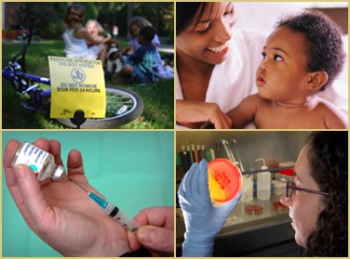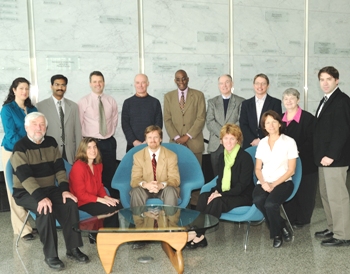UAlbany Scientists Advance Research on Array of Public Health Issues
 |
Scientists at UAlbany's School of Public Health are advancing research on a variety of public health issues, from vaccinations, to cancer therapies and environmental toxins. |
Overlooking the Hudson River and the State Capital from both sides of the Hudson River, a team of scholars and researchers form the faculty of the University at Albany School of Public Health. Soon to celebrate 25 years, the School is a unique partnership between the University at Albany and the New York State Department of Health(NYSDOH).
The faculty roster, initially built with expert researchers from the NYSDOH's Wadsworth Laboratories, has grown to include 32 University-based, full-time faculty and over 100 Department of Health public health researchers and experts.
Over the past year, University-based faculty of the School have been awarded more than $12 million in grants for research and training, with topics ranging from cancer to aging to obesity, cardiac outcomes and public health leadership training. A number of the researchers were awarded American Recovery and Reinvestment Act (ARRA) initiative funding, totaling $4,150,957, with $2,229,174 in stimulus grants and $1,921,783 in challenge grants.
"Over the past year, School of Public Health faculty have succeeded in obtaining significant funding to support studies on important public health topics," said Dean Philip C. Nasca. "The School's hallmark public health training programs and broad array of research showcase the exceptional efforts of scientists who are committed to improving the quality of life for people in New York as well as all corners of the globe."
"This outstanding track record of funding for the University at Albany School of Public Health is a testament to the prominence and work ethic of the School's excellent faculty," said Associate Dean for Research Edward Hannan. "The list of topics and funding agencies is wide-ranging, impressive, and indicative of the impact our faculty has on the practice of public health in the U.S. and the world."
 |
UAlbany School of Public Health researchers have been awarded grants and additional funding totaling more than $12 million in 2009-10. (Photo Mark Schmidt) |
The grants include:
- Janine M. Jurkowski and Kirsten K. Davison received a $1,087,998 stimulus grant from the National Center for Minority Health and Health Disparities to develop a childhood obesity prevention program in collaboration with families with children enrolled in Head Start and community based organizations in Rensselaer County.
- Thomas Begley received two National Institutes of Health (NIH) stimulus grants, including $454,248 to study translational machinery in stress signaling and tumor suppression and another for $345,244 to explore the connection between tRNA methylation and the DNA damage response.
- Edward L. Hannan received a $925,499 Challenge Grant to study long-term survival of cardiac patients undergoing coronary revascularization procedures.
- JoEllen Welsh received a $996,334 Challenge Grant to study how dietary factors protect cells from environmental agents that can cause cancer.
- The Center for Continuing Public Health Education received a $341,684 stimulus grant from the U.S. Centers for Disease Control (CDC) to develop The Nurse-Training on Immunization Project (TIP) Program to train nurses throughout the U.S on immunization and vaccine safety.
In addition to ARRA funding, SPH faculty successfully obtained over $7,832,234 in grant funding to support research as described below:
- Chittibabu Guda was a $946,875 grant by NIH to develop a comprehensive system to catalog the subcellular and suborganellar proteomes of sequenced genomes
- Edward Fitzgerald received a $176,489 Academic Research Enhancement Award (AREA) stimulus grant from the National Institute on Aging (NIA) to examine the association between exposure to perflourinated compounds (PFCs) and nervous system and thyroid function among older adults aged 55 to 74 years to examine if PFCs cause subtle defects in learning and memory.
- Thomas Begley was awarded $1,810,571 million by NIH to study RNA modifications as biomarkers of environmental stress and inflammation.
- Douglas Conklin was awarded $1,257,452 from National Cancer Institute (NCI) to study the NR1D1 gene, $208,876 from the Susan G. Komen Foundation for analysis of NR1D1 and $264,177 from the U.S. Army Medical Research Acquisition Activity for analysis of NR1D1.
- JoEllen Welsh was awarded a $275,000 grant from NIH to continue her studies linking vitamin D and breast cancer.
- The Northeast Public Health Leadership Institute, led by Dwight Williams, was awarded a $61,565 CDC grant to continue leadership development training to public health practitioners in the northeastern U.S. region.
- Erin Bell received grant of $928334 from the CDC to continue the National Birth Defects Prevention Study, a large population-based case-control study to identify environmental and genetic factors that contribute to the occurrence of birth defects of unknown etiology.
- Timothy Hoff was awarded $92,040 in funding to support research on Nonpayment for Preventable Complications: Impact on Hospital Practices and Health to examine the new U.S. government nonpayment policy for hospital-acquired infections (HAIs) and how it affects practices and patient safety outcomes. The project is funded by the National Institute of Allergy and Infectious Diseases, part of NIH.
- David Carpenter received $495,995 in funding for a follow-up study on the impact of polychlorinated biphenyls (PCBs) and lead (Pb) on the reproductive health of Akwesasne Mohawk women living near the St. Lawrence River, part of a $6.8 million grant from the National Institutes of Health to the University�s Center for the Elimination of Minority Health Disparities (CEMHD).
- The Center for Continuing Public Health Education received a grant of $365,666 from the U.S. Department of Labor to develop a training program, PHN Ready: Technology Based Training Program for Public Health Nurses.
- Igor Kuznetsov was awarded a $227,250 grant from NIH to develop accurate high-throughput computational methods for predicting protein interfaces involved in protein-protein and protein-nucleic acid interactions. The purpose is to allow researchers to perform genome-scale analyses of protein interactions involved in human diseases, including cancer-related interactions such as the ones involved in gene regulation and signal transduction.
- Louise-Anne McNutt received a $131,208 funding from CDC to study ELC injection safety.
- David Carpenter received a $299,736 grant from Higher Education for Development to study Drinking Water Supply, Sanitation and Hygiene Promotion Health Interventions in Two Urban Communities of Kampala city and Mukono Municipality, Uganda.
- The Prevention Medicine Residency Program received a $300,000 American Cancer Society Sanford H. Goldstein Physician Training Award grant to train physicians for leadership roles in public health and preventive medicine through the New York State Preventive Medicine Residency (PMR) program.
![]() For more news, subscribe to UAlbany's RSS headline feeds
For more news, subscribe to UAlbany's RSS headline feeds


